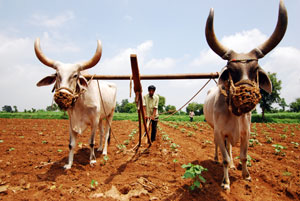What makes farmers likely to adapt to climate change?
Small farmers in Asia and sub-Saharan Africa with few assets are more likely to change their farming practices to adapt to climate change if they have access to weather information and are part of a local agricultural or natural resource management-r...
Small farmers in Asia and sub-Saharan Africa with few assets are more likely to change their farming practices to adapt to climate change if they have access to weather information and are part of a local agricultural or natural resource management-related group, according to new research by CHANS-Net members.
The paper, “Smalholder farmer cropping decisions related to climate variability across multiple regions,”
 |
| Photo by Amir Jina |
will be published in an upcoming issue of Global Environmental Change.
“In this study we ask about three potential key factors influencing farming households’ ability to adapt: access to weather information, household and agricultural production-related assets, and participation in local social institutions,” write the authors, including lead author and CHANS-Net member Stephen Wood, of Columbia University. Wood was a 2013 CHANS Fellow.
“We used a 12-country data set from sub-Saharan Africa and South Asia to explore the links between these three potential drivers of agricultural change and the likelihood that farmers made farm-associated changes, such as adopting improved crop varieties, increasing fertilizer use, investing in improved land management practices, and changing the timing of agricultural activities,” they continue.
While the results varied across countries and types of practices, the three factors were associated with households reporting making farming changes in recent years.
“Understanding these drivers and outcomes of farm-associated changes across different socio-economic and environmental conditions is critical for ongoing dialogues for climate-resilient strategies and policies for increasing the adaptive capacity of smallholders under climate change,” the scientists write.
Co-authors are CHANS-Net members Meha Jain, also of Columbia University and a 2012 CHANS Fellow, and Ruth DeFries, Denning Professor of Sustainable Development at Columbia University and member of the CHANS-Net Advisory Board, and Amir Jina, of Columbia University, and Patti Kristjanson, of the World Agroforestry Centre.



 Print
Print Email
Email